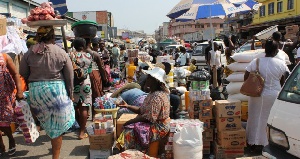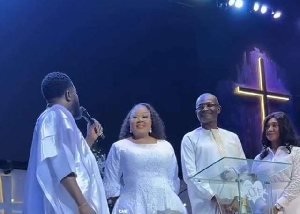Election anxiety is forcing traders at major markets in the city to reduce prices of their products as they await the outcome of the 7 December election.
The country goes to polls on early next month in a keen contest that has been preceded by a pocket of skirmishes between the two major political parties, the National Democratic Congress and the New Patriotic Party.
Traders are very anxious about the outcome of the elections with some reducing their goods to clear so they could be in their various homes as they await the results.
At the Osu Oxford Street, a popular place known for petty trading, traders told the B&FT that they have been forced to reduce their products to enable them sell as much as they can before the election day.
“At least if I sell all my goods and get my capital, I will save it in a bank and go to my village and vote and then stay there till the results are announced. After some few days then I will come and start my business, Oppong, a beads seller on the Oxford Street said.
Oppong who usually sells his hand beads ranging from GHc10 to GHc30 said he has reduced them by between five to 10 percent in order to attract more buyers.
A shoe seller who plies his trade on the same route also disclosed to this paper that the tensed nature of the elections has forced him to reduce the prices of his goods as nobody can predict what lies beyond the elections.
An anxious Amartey told the B&FT that he will still get his loss profit during the charismas season because during charismas they sell more at a higher price.
“The normal price for my shoes are between GHc50 to GHc100 depending on the quality and the design but now I will be selling below the price,” he said.
Traders at the Kwame Nkrumah Interchange also have similar intentions as a second cloth seller, Yaw Donkor, believes this election is very crucial than any other he had witnessed in the country and as a result wants to sell off his products before the election day.
This, he said, will make him be in the house and monitor happenings during and after the election day.
Meanwhile, the Ghana Police Service has assured on countless occasions assured the business community of conducting their business without fear of terrorism and post-election violence, as the service has put in place the necessary mechanisms to check these threats.
Public Relations Officer of the Greater Accra Police Command, Assistant Superintendent of Police (ASP) Afia Tenge, who spoke to the B&FT in an earlier interview, the police service in every election year sets up an election task force comprising all stakeholders, and the other security agencies to ensure elections are conducted in a peaceful environment before, during and after the polls.
Election history
Elections, since the return to civilian rule in 1992 have seen both parties voted out of office, establishing Ghana's democratic credentials in a region that has seen its share of rigged polls and coups.
Mr. Mahama won the 2012 election by a margin of only 325,000 votes out of 11m, a situation that led the opposition NPP to challenge the result at the supreme court the Supreme Court took until August 2013 to uphold the original result. That prolonged a sense of national unease that rattled investors and hobbled Mr. Mahama’s new government.
Political analysts believe the peaceful ejection of ruling parties, in 2000 and again in 2008, set an admirable trend and the prompt acceptance of the Supreme Court’s verdict on the election in August by the losing candidate, Nana Akufo-Addo, whose New Patriotic Party was laudable.
Business News of Friday, 25 November 2016
Source: thebftonline.com













